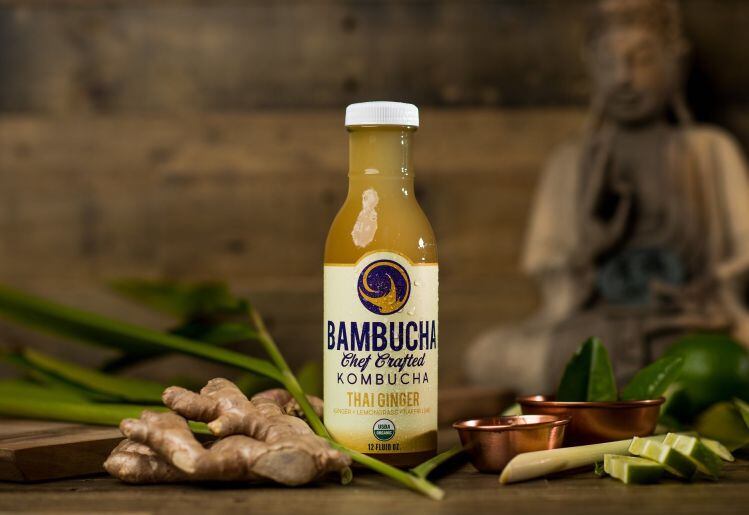The brainchild of classically-trained chefs Michael ZonFrilli and Steven Strupp, Bambucha Kombucha was launched around 18 months ago in San Diego after ZonFrilli, who had first experimented with making kombucha almost 20 years ago, started tasting products from local producers and realized that with his culinary background, "I could do a better job."
And while the world probably doesn’t need another pair of home brewers looking to take their hobby to the next level, acknowledged Strupp, there is definitely a place for culinary-inspired brands offering more sophisticated and complex flavor profiles, hence their ‘chef-crafted’ moniker.
“GT’s is an amazing product and they have forged a path for the rest of us, but I think some other brands are relying on extracts and not using a lot of fruit, and that’s what really inspired us. Some are overly acidic and some are more tea based and really lack that bright acidic flavor, but the beauty of it is that there is room for all of these styles.
“Some people like a flatter less acidic kombucha, but I want it to blow my head off.”
When it comes to flavor, he said: “We didn’t want to put out another berry kombucha, everyone else is doing that, so we have a blueberry tart flavor with blueberries, almonds and vanilla. We're balancing the flavors so we don’t have to use so much sugar, while the almonds really make the blueberries pop.”

People were begging for a plain ginger and we just couldn’t do it
ZonFrilli said: “We’ve been tasting and critiquing foods for so long that we know what really pops. People were begging for a plain ginger and we just couldn’t do it! So we’ve got a Thai ginger flavor, which combines ginger root, kaffir lime leaf and lemongrass – so we’ve got that southeast Asian thing going on.
"We’ve also got classic pairings such as our Mango Masala, which combines mango and lime with turmeric, ginger and cayenne," added ZonFrilli, who is looking for investment that will help the brand scale up production significantly over the next six months.
While Bambucha Kombucha love to wax lyrical about its flavor profile, however, it does not make any hard health claims about its wares, he stressed.
“Health benefits are a wonderful magical bonus of kombucha, but we’re not making any health claims. Our products are refreshing and delicious, and if they deliver additional benefits, that’s just the icing on the cake."
Brands like ours are seen like craft beers versus bigger brands such as GT’s, KeVita, Health-Ade
Not surprisingly, given their approach, the first customers for Bambucha kombuchas were in the restaurant trade, although Strupp and ZonFrilli also picked up business with yoga studios and bars, he said: “We love working with mixologists. You just add a splash of our kombucha to liquor and you've got a complex, but consistent, cocktail your can serve.”
However, the brand is also picking up retail accounts from high-end grocery retailers and health food stores as buyers look for something more distinctive from the local brands in their functional beverage sets, he added.
“We’ve been focusing on San Diego and we’ve been slowly moving into Orange County, Los Angeles and Thousand Oaks.
“It’s definitely an easier sell when you are a local brand, because people recognize this as an artisanal product. I think brands like ours are seen like craft beers versus big brands such as GT’s, KeVita, Health-Ade, Reed’s and so on. They also like the fact we’re using an organic biodynamic local farm to source some of our ingredients, which you wouldn’t see in a mass produced product.”
Controlling alcohol levels
Asked about controlling sugar and alcohol levels in kombucha, which has landed some brands in the category in legal hot water, ZonFrilli said: “We’ve tested competitor products and a lot of them are over 0.5% abv.
“We filter our inoculate/starter for every new fermentation to reduce the amount of yeast that’s always growing, but it’s not going to take out the lactobacillus strains. When we are done with the fermentation, we filter a second time with an extremely fine micron filter that pulls out the yeast before we carbonate the beverage and add flavorants, so the yeast doesn’t continue to ferment [convert sugar to alcohol] in the bottle.”
Asked about standards of identity for kombucha, he doesn't like the idea of anything too prescriptive when it comes to formulations, but would like to see a distinction between raw and heat pasteurized products:
“In my opinion if it is cooked and probiotics are added on the back end, it’s not really kombucha.”
